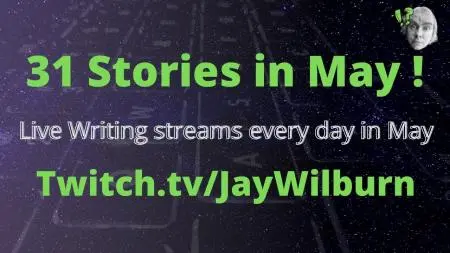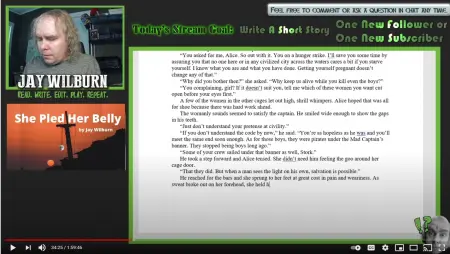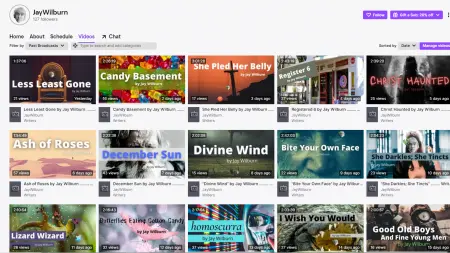In a desperate attempt to keep myself relevant and draw undeserved attention to my writing, I keep coming up with gimmicks to try. This time I decided to write a story a day for the entire month of May while livestreaming on Twitch. When I tell this story to other people, I frame it to make me look like an innovator, a thought leader, and worthy of admiration.
Over the past year, Twitch has become a source of writing income for me. It is a livestreaming platform I’m still developing as part of my author brand. Streaming every day for a month, writing a new story every day, was a way to bring more attention to my channel.

The Quirks of Live Streaming Writing
I’m better at it now, but the act of writing a story from scratch in front of an audience who can interact with you is unnatural to the fundamental nature of writing. It takes what is typically a solitary, introspective creative process and turns it into a bit of a performance. In my case, I speak the words out loud as I’m typing the story on screen for everyone to see and hear. I’m telling the story as I’m writing it. I’m also stopping to answer questions or discuss ideas with those commenting in the running chat on the stream.
The nature of the videogame-centered streaming of Twitch is that people tend to pop in and out of the stream for short periods of viewing time. Others will lurk for longer. Some put the stream on in the background as they do other things. This leads to a phenomenon where spikes in viewer numbers and participation in chat will come along the longer a stream has been going. I found that many of these peak viewing moments came near or after the two-hour mark. That’s not inconsistent with the findings of many videogame streamers.
Working on one story for two hours or more while live streaming is a lot. I wanted to get those peaks in participation, so I came up with a system for blocking the time. My first block is the new story written from scratch live. That takes the most time and, depending on the length of the story, can get me at or near the two-hour mark. For the second block, I do the first edit of a story I wrote the previous day. I make and explain my changes as I read through the story live. The third block involves the reading of a story already edited and in its final draft form. Sometimes, I have a fourth block where I read, share, and discuss an article or blog post on writing that I wrote or someone else wrote that I share with permission from the publisher of the piece.
These blocks get me to between two and three hours of streaming. It gets me into those higher levels of interaction and increases my chances for follows, subscriptions, bits, gifted subs, and the other monetization elements of Twitch. It also leads to more people checking out and buying the books I have conveniently linked in my “about” section below the stream.
These blocks are ordered by greatest to lowest levels of required attention. The writing is first and takes the most time. People who come in at the beginning to see that are often already following me and want to see the story unfold before their eyes. The editing is closer to a reading and goes quicker. The straight reading is a much more familiar format to casual viewers. The article doesn’t require following a narrative and people can come into the discussion at any time. The later a viewer drops in the easier it is for them to join the stream in progress.
Streaming every day for a month allowed me to test the best days and times for interaction. It gave me data to set a regular schedule going forward. It allowed me to streamline the mechanics of the streaming process and my presentation.

The Quirks of Writing 31 Stories in a Row
• Not Every Story was Great
I’m sure many of you guessed this would be the case. This is also true if you write short stories slower over a much longer period of time. Not every story delivers. I don’t lose anything by writing those less stellar stories in the middle of the ones that work better. Nothing stops me from trying that story idea again in a different form.
• More Good Stories Than I Expected
I don’t claim any of the 31 stories I wrote in May are the greatest tales ever written. I will say that a number of them were some of the best I personally have written, though. Some of them were more daring and more surprising than stories I’d written before. I’m proud of more of them than I ever expected to be. Some of the stories I wrote I either would have never attempted or would have given up on if I wasn’t committed to producing one a day. I’m proud of that too.
• My Bad Habits Become More Obvious
I had a ton of people “stopping short” and “looking.” Oh, boy, were my characters looking a lot. The more aware I was of that kind of stuff the better I got at catching it and correcting it in process. I also found myself defaulting to horror stories. Nothing wrong with that, but I made a conscious choice to push some stories into other genres to change things up, to give my mind a chance to explore other things.
• You Burn Through Your Ideas Quickly
I keep a list of potential story titles that catch my fancy. Sometimes I have a story idea already attached to the title. Other times I just think the phrase is cool and I wait for an idea to match up to it. That list got crossed off fast as I powered my way through the month's writing. I found myself looking and listening everywhere for new ideas. That wasn’t necessarily a bad thing either, though.
• Preparation is Important
My outlining for short stories is typically scant, but I found that if I come up with names early, that helps a lot. Character names, street names, school names, town names, kingdom names, and pirate ship names already listed out keep me from stopping in midsentence or using the same names over and over. Researching small details about the settings of stories in advance helped me frame the backstory on the fly. Knowing in advance what I was writing on a particular day or the day after gave me time to allow the ideas to develop in my head before I sat down and turned on the camera.
• Trusting Yourself is More Important
Every story starts with a blank page. You put down a title, claim it with your byline, set your paragraph indentions, and write that first sentence. That is true whether I’m streaming live or writing in private. I guess the key difference is that there is no risk of anyone seeing me freeze up when no one is watching. I’ve written a lot of stories in my life, though. Those blank pages have successfully filled up with complete stories over and over again. Preparation is important, but I have found that trusting myself to tell a story is even more important. That faith in myself pushes out fear and I produce better stories in the end as a result.
• Editing is Gold
God bless the editors who have put up with my work over the years. I have gotten better at fixing more of the story and grammar issues myself before I subject a professional editor to my work. When you write 31 stories in as many days, self-editing is vitally important. The difference between the story working or not is in those adjustments after the first draft. If I’m willing to take on the work of editing and revising, then I can write the first draft without fear. I can get the story down without hesitation or second-guessing. Editing turns that first draft sprawl into something that connects and holds together.
• Quantity of Practice Reduces Fear and Clears the Way for Quality
We lean toward quality over quantity with most things for good reason. In terms of final products, it’s a good policy in life. Producing less work does not guarantee quality though. You seldom hear the idea “he’s only written three stories his whole life, so they must be great.” Quality practice is important too. The repetition of skills that leads to proficiency comes from a quantity of practice. Not all the stories I wrote that month were great. Some got better after editing, but not all were my best stuff. I do believe the ones that were my best stood on the backs of all those other stories that got me into the storytelling flow. They all sharpened my skills and improved the execution of my creative work.

I Had Fun and I Shared That Joy with Others
Being a writer is my full-time career and I take it seriously. Since 2013, when I quit teaching to write full-time, I’ve paid my bills and supported my family from money earned by writing. At times, that has been a tightrope walk of budgeting and creative financing. It also involved times of furious wordcounts and pieces that were sometimes just for the money because rent was due. The business side of writing is a daily concern even now.
I’m developing Twitch as an author platform with monetization always in mind. Every other platform and mode of publication I consider, the financial calculation is always a big part of the decision.
I had fun doing this, though. I enjoyed the viewers who expressed how much they enjoyed particular stories. I liked answering people’s questions in the midst of writing and felt good when they told me they were inspired. It meant something to me. It energized me. Most of all, I was into the stories I was creating purely for the act of telling a story. There was joy in it, and I got the opportunity to share that in real time while engaging in an artform that is usually solitary.
Ray Bradbury promoted the idea of writing a story a week because he said it was impossible to write 52 bad stories in a row. John Urbancik produced amazing stories with his Ink Stains project, where he wrote a short story every day for an extended period of time. In my opinion, he is one of the greatest short story writers ever. I can’t help but believe all that practice was part of it.
If you are considering an idea to shake things up and get you out of a rut, writing a story every day for a month is crazy, but it might work. If you want to get really crazy, consider doing it live while readers are watching.

About the author
Jay Wilburn lives with his wife and two sons in beautiful Conway, South Carolina. He is a full-time writer of horror and speculative fiction. Jay left his job as a teacher to become a full time writer and has never looked back. Well, that’s not entirely true. He wants to be sure he isn’t being followed, so he looks back sometimes.








